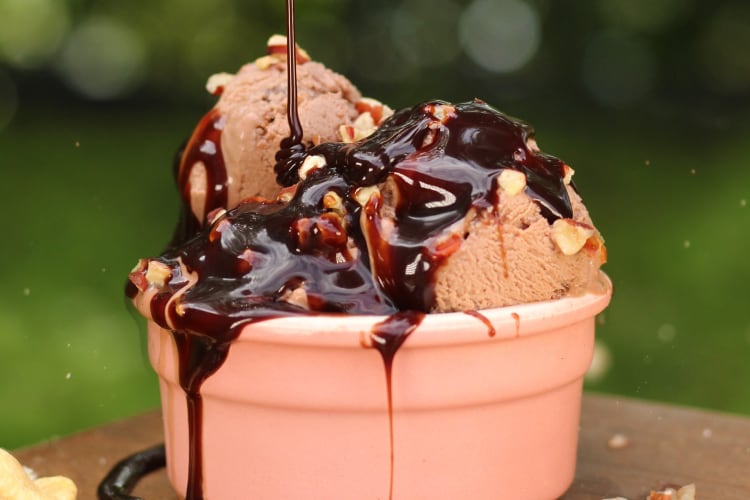The global ice cream market is predicted to reach almost $105 billion (€101 bn) in 2029, up from the anticipated $73.6 billion (€70.7 bn) it is expected to reach in 2022—a near 43% rise in less than a decade, Fortune Business Insights forecasts. In 2021, the global ice cream market was valued at almost $71.5 billion (€68.7).
In the first five months of 2021, hard ice cream production was up 4% from 2020 levels in the US, the International Dairy Foods Association (IDFA) noted. In the US alone, the ice cream industry has a $13.1 billion (€12.5 bn) impact, according to the IDFA’s Dairy Delivers. In addition, from March through May of 2021, sales of frozen novelties like fudgesicles and ice cream bars increased by 24% compared to the same period in 2019.
In IDFA’s most recent trends survey, the US dairy food organisation identified six key trends guiding ice cream manufacturers’ product development efforts. Several of these are associated with influencing the popularity of plant-based ice cream, including health and wellness products, natural products and clean labelling.
Ongoing plant-based development
DairyReporter spoke to one plant-based ice cream, Booja Booja, to get the lowdown on its offering. Booja Booja vegan ice cream was launched fifteen years ago and relays that it was one of the UK’s first premium, dairy-free ice creams.
When the brand launched its vegan ice cream range, Booja Booja was well acquainted with the vegan, free-from market and 'ice cream was a logical extension of our product range', said Matt Gilding, Managing Director of Booja Booja.
Taste is paramount
In the meat-mimicking market and dairy alternatives space, developing products that reflect the quality and taste of their non-vegan counterparts has been an ongoing challenge.
For consumers, achieving a sensorial portfolio that matches non-plant-based varieties is vital, with taste, texture and flavour all core focus areas for manufacturers. As plant-based ice cream varieties gain traction, brands specialising in vegan ice cream prioritise taste to appeal and encourage uptake.
“Deliciousness is always one of our top priorities, so we spent a long time researching, developing and tweaking our ice cream recipes before we were happy that their taste and texture met our very high standards,” added Gilding. “We weren’t, and never will be, happy with being ‘good enough for free from; we only make products that taste as good if not better than their conventional counterparts.”
Booja Booja uses cashew nuts for its ice cream base because, it says, the flavour profile is full and creamy. It believes that non-dairy ice cream should be just as creamy as traditional non-dairy ice cream. “Added to the cashews, we use just a handful of simple, natural ingredients, where possible avoiding refined sugar,” Gilding said.
In 2016, the brand introduced an array of new flavours to its ice cream range, featuring inclusions for the first time. Today, the brand’s range comprises eight flavours, including raspberry ripple, chocolate salted caramel, caramel pecan praline and honeycomb caramel. “With the vegan and dairy-free market now larger than ever before, there is no excuse for non-dairy ice creams not to give consumers the same exciting, indulgent experience offered by conventional premium ice cream brands,” revealed Gilding.
Looking to the future, Booja Booja says it will continue to make its vegan ice creams with the finest natural, simple, organic ingredients. The brand states it is always researching, tweaking and developing its products, with new varieties on the horizon. However, it states its standards remain as high as ever, so it will only launch a new flavour when it is 100% sure it has optimum taste.
Big players’ plant-based offerings
Global brands, including household names, are also growing their plant-based ice cream ranges. Multinational groceries retailer, Tesco, relayed that it has introduced vegan ice cream in-store and online to cater to customers’ evolving tastes—particularly the increasing popularity of plant-based alternatives.
Currently, more than 1 in 10 of its ice cream lines are vegan, with other lines due to be launched in the coming months. Tesco revealed that it regularly includes plant-based ice cream in its Clubcard Prices deals including Magnum vegan almond ice creams.
Ben & Jerry’s continues launching more non-dairy offerings today, following its first flavours released in 2016. “We do it for one simple reason: our fans want it,” said Sean Greenwood, Grand Poobah of PR, Ben & Jerry’s. “As we have been embracing plant-based Ben & Jerry’s flavours, we have become a leader in the “super-premium” category as based on high-quality ingredients and less air,” he added.
The brand notes it currently has 18 active non-dairy flavours in the US line-up, but there are not as many in other parts of the world. “I count 58 total ice cream flavours,” said Greenwood, adding that 31% of the brand’s offerings are non-dairy.
Ben & Jerry’s variety of non-dairy bases consist of almond milk and sunflower butter. They use coconut oil in those mixes to play the role that cream would serve as a fat for texture, mouthfeel and quality.



